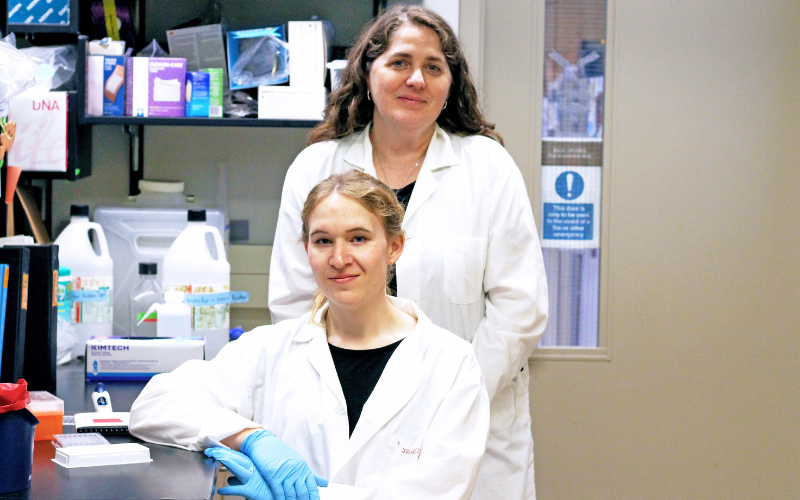From Kidney to Pancreas: The Multi-faceted Role of Nephrin in Human Health

It’s often said that communication is the key to success – and nowhere may this be more true than in our cells.
Cells are the fundamental unit of life, and through their communication, they influence everything from growth and survival to disease response and progression. Cellular communication happens through intricate signalling pathways – molecular conversations triggered by biological cues that influence how the body responds.
 Dr. Nina Jones and her research lab in the Department of Molecular and Cellular Biology specialize in understanding the process of cell signaling, or “signal transduction.” Think of it as an avalanche of molecular interactions where a single small cue – like a shift in a protein’s shape – initiates a cascade of events, which lead to significant biological outcomes, such as changes in organ systems. And when the process becomes dysregulated, major problems can result, making the study of these molecular interactions crucial.
Dr. Nina Jones and her research lab in the Department of Molecular and Cellular Biology specialize in understanding the process of cell signaling, or “signal transduction.” Think of it as an avalanche of molecular interactions where a single small cue – like a shift in a protein’s shape – initiates a cascade of events, which lead to significant biological outcomes, such as changes in organ systems. And when the process becomes dysregulated, major problems can result, making the study of these molecular interactions crucial.
One area of longstanding interest for the Jones lab is signalling pathways in specialized kidney cells called podocytes. These cells extend unique finger-like projections that are key to their role in blood filtration. A protein called nephrin is intimately linked to these so-called “foot processes,” acting as a gatekeeper between each podocyte that prevents proteins in the blood from leaking into urine and being lost from the body.
But nephrin’s role doesn’t stop there. Inside the cell, it also acts as a signalling hub. Through a process called phosphorylation, the protein changes its shape and recruits other molecules involved in cell signalling, contributing to podocyte movement and flexibility, ensuring that the kidneys function properly.
While nephrin is best known for its role in the kidneys, it turns out that it is also highly expressed in cells in the pancreas called “beta-cells.” However, much of how nephrin communicates in these cells has, until now, remained a mystery.
 “Most research on nephrin has focused on kidneys. Its role in the pancreas has been largely unexplored,” explains Dr. Casey Williamson, a recent PhD graduate in the Jones lab who led the investigation.
“Most research on nephrin has focused on kidneys. Its role in the pancreas has been largely unexplored,” explains Dr. Casey Williamson, a recent PhD graduate in the Jones lab who led the investigation.
Pancreatic beta-cells are responsible for producing insulin – a hormone essential to blood sugar regulation. When the body is unable to produce or utilize insulin, diabetes can result, leading to excess amounts of sugar in the blood.
Intrigued by the presence of nephrin in pancreatic beta-cells and its potential involvement in blood sugar regulation, Jones and Williamson decided to investigate. To do so, they took advantage of a mouse line that produces a modified form of nephrin with disrupted phosphorylation sites and an impaired signaling ability.
Their study uncovered something unexpected: mice with modified nephrin secreted higher amounts of insulin. As the mice aged into late adulthood, they also had a better tolerance to sugar, with their pancreatic cells showing fewer age-related changes compared to normal mice.
These findings suggest nephrin’s role may extend far beyond the kidneys – it may have some involvement in blood sugar balance.
With diabetes on the rise around the world, especially as people age, understanding how nephrin influences insulin secretion could open the door to new therapeutics. For instance, targeting specific phosphorylation sites in nephrin may allow researchers to develop drugs which enhance insulin production – offering a new approach to managing diabetes.
“Nephrin is uniquely expressed in these two different parts of the body – kidneys and pancreas,” Williamson highlights. “Its specific role in these areas makes it a promising target for future clinical treatments.”
This research highlights the importance of understanding cell signalling at the molecular level. In the end, these “molecular conversations” are far more than a scientific curiosity – they could hold the key to improving the health of millions of people.
Read the full study in the journal Endocrinology.
Read about other CBS Research Highlights.